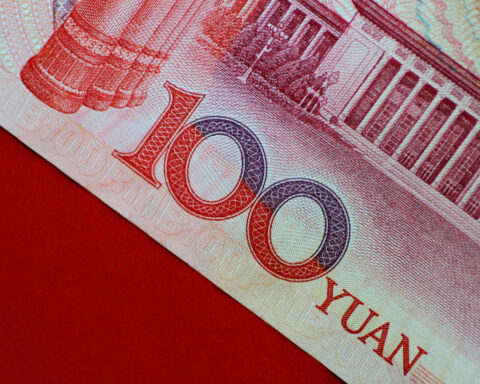By Lucia Mutikani
WASHINGTON (Reuters) -U.S. import prices fell by the most in nine months in September amid a sharp decrease in the cost of energy products, pointing to a benign inflation outlook that keeps the Federal Reserve on course to continue cutting interest rates.
The report from the Labor Department on Wednesday also showed import prices excluding fuel barely rising over the past three months. The report followed data last week showing slightly firmer consumer prices in September.
While producer prices were unchanged last month, some components showed strength, which was expected to translate into a higher monthly readings in the key inflation measures tracked by the U.S. central bank for its 2% target.
"Import prices do not feed through directly to producer and consumer prices but are a signal inflationary pressures remain muted and adds some support to another rate cut in November," said Matthew Martin, a senior U.S. economist at Oxford Economics. "In tandem with falling prices at China's factory gates, import price gains will be modest."
Import prices slipped 0.4% last month, the biggest drop since December 2023, after a revised 0.2% decrease in August, the Labor Department's Bureau of Labor Statistics said. Import prices were previously reported to have declined 0.3% in August.
Last month's drop in import prices, which exclude tariffs, was in line with economists' expectations.
In the 12 months through September, import prices dipped 0.1%. That was the first year-on-year drop in seven months and followed a 0.8% increase in August.
Imported prices of fuels and lubricants plunged 7.0% after falling 2.9% in August. They were pulled down by a 7.1% tumble in the prices of petroleum.
Imported natural gas prices plummeted 14.5%. Excluding fuel, import prices rose 0.1% for the third straight month. They increased 1.8% year-on-year in September.
Food prices dropped 1.5% after rising 0.2% in August, reflecting a 12.2% decline in vegetable costs.
Excluding fuels and food, imported prices gained 0.3% after being unchanged for two straight months. The so-called core import prices increased 1.7% year-on-year in September.
TAME READINGS
The dollar weakened through much of September against the currencies of the United States' main trade partners. It has since regained ground. The U.S. central bank is expected to cut interest rates again next month, but by a smaller 25 basis points against the backdrop of a resilient economy.
The Fed launched its easing cycle with an unusually large half-percentage-point reduction in its policy rate to the 4.75%-5.00% range in September amid growing concerns about the labor market. It hiked rates by 525 basis points in 2022 and 2023 to combat a surge in inflation.
Prices for imported capital goods were unchanged after climbing 0.2% in August. Imported motor vehicles, parts and engines prices rose 0.2% while consumer goods, excluding automotives, rebounded 0.2%.
Prices of goods imported from China were unchanged after edging up 0.1% in August, which was the first monthly gain since October 2022. Prices for Chinese imports dropped 1.0% year-on-year in September.
But prices for Japanese imports fell 0.2% on a monthly basis. Prices for imports from Canada decreased 1.6%, while those from Mexico fell 1.1%. European Union import prices edged down 0.1%.
"Import prices are not an obstacle in returning inflation back to the Fed's 2% target," said Conrad DeQuadros, senior economic advisor at Brean Capital.
The report also showed export prices fell 0.7% last month after sliding 0.9% in August. They were pulled down by a 0.9% decrease in prices of nonagricultural exports, which more than offset a 0.6% advance in agricultural goods. There were increases in the prices for nuts, other food preparations, meat, wheat and corn. But export prices for soybeans fell.
In the 12 months through September, export prices dropped 2.1%. That was the biggest decline since January and followed a 0.9% decrease in August.
(Reporting by Lucia Mutikani; Editing by Paul Simao and Andrea Ricci)

 Trump has begun another trade war. Here's a timeline of how we got here
Trump has begun another trade war. Here's a timeline of how we got here
 Canada's leader laments lost friendship with US in town that sheltered stranded Americans after 9/11
Canada's leader laments lost friendship with US in town that sheltered stranded Americans after 9/11
 Chinese EV giant BYD's fourth-quarter profit leaps 73%
Chinese EV giant BYD's fourth-quarter profit leaps 73%
 You're an American in another land? Prepare to talk about the why and how of Trump 2.0
You're an American in another land? Prepare to talk about the why and how of Trump 2.0
 Chalk talk: Star power, top teams and No. 5 seeds headline the women's March Madness Sweet 16
Chalk talk: Star power, top teams and No. 5 seeds headline the women's March Madness Sweet 16
 Purdue returns to Sweet 16 with 76-62 win over McNeese in March Madness
Purdue returns to Sweet 16 with 76-62 win over McNeese in March Madness








